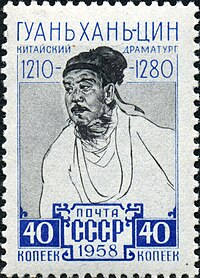Guan Hanqing

| Guan Hanqing | |||||||||
|---|---|---|---|---|---|---|---|---|---|
| Traditional Chinese | QuanHánKhanh | ||||||||
| Simplified Chinese | QuanHánKhanh | ||||||||
| |||||||||
Guan Hanqing(traditional Chinese:Quan hán khanh;simplified Chinese:Quan hán khanh,c.1241–1320); sobriquetYǐzhāi( dĩ trai ),Yīzhāi( nhất trai ),Yǐzhāisǒu( dĩ trai tẩu ); was a Chinese dramatist, playwright, and poet during theYuan Dynasty.He has been described as among the most prolific and highly regarded dramatists of the Yuan period.[1]
Life
[edit]Guan Hanqing was undoubtedly the most productive and creative playwright of northern plays. Described by Jia Zhongming as “the leader of thePear Garden”(liyuan lingxiu lê viên lĩnh tụ ), Guan was fully immersed in the theatrical scene of his time and was well known amongst both actors and his fellow peers. He is even said to have painted and powdered his face (mianfu fenmo diện phó phấn mặc ) while acting on stage. He is credited with the writing of 68 plays, of which only 18 survive, three in fragments. These were written mostly in thevernacularof the time. In some cases, attribution is highly disputed. In addition to playwriting, Guan Hanqing is also said to be a master of songs (sanqu tán khúc ). 57 of his songs (xiaoling tiểu lệnh ) and 14 song suites (taoshu sáo sổ ) survive. Guan spent much of his later life inDaduand toHangzhouin the south. Above all, Guan Hanqing is celebrated for his uplifting portrayal of the downtrodden.[2]
Works
[edit]- The Injustice to Dou Ea.k.a.Snow in Midsummer( cảm thiên động địa đậu nga oanGǎn Tiān Dòng Dì Dòu É Yuān)
- The Injustice to Dou E That Touched Heaven and Earth, also known as Snow in Midsummer, is regarded as one of Guan Hanqing's most popular plays. A young girl named Dou Duanyun is sold as a child bride in order for her father to pay the necessary funds to travel to the capital for an official exam. She is then forced to change her name to “Dou E”. The play begins after Dou E's husband has died two years after their marriage, leaving Dou E and her mother in law alone. After Dou's mother in law is almost strangled to death by a doctor who refused to give back the money he owed them, they are rescued by a man named Zhang Lü’er. Zhang then moves in for the purpose of “offering protection”, but eventually tries to force Dou E into marriage. After Dou E's mother gets a sudden craving for soup, Zhang Lü’er devises a plan to poison her so he can take Dou E for himself. This plan however backfires and Zhang's father ends up eating the soup and dies. Dou E is framed for this crime, and is later sentenced to death after being tortured and eventually confessing to spare her step mother from torture. As she is brought to the execution ground she swears by her innocence and states that it will be proven by the following three events that will occur after her death: her blood will float up onto the hanged white ribbons but will not drip onto the ground, there will be heavy snowfall in the midst of summer that will cover her dead body, and Chuzhou will experience drought for three years. All three events happened after Dou E's death.[3]
- Saving the Dusty-windya.k.a.Saving the Prostitutea.k.a.Rescued by a Coquette( triệu phán nhi phong nguyệt cứu phong trầnZhào Pàn Ér Fēng Yuè Jiù Fēng Chén)
- The Conference of a SingleDaoa.k.a.Meeting the Enemies Alonea.k.a.Lord GuanGoes to the Feast( quan đại vương độc phó đan đao hộiGuān Dà Wáng Dú Fù Dān Dāo Huì)
- The Pavilion of Moon-Worshipa.k.a.The Secluded Chamber( khuê oán giai nhân bái nguyệt đìnhGuī Yuàn Jiā Rén Bài Yuè Tíng)
- A Butterfly Dream( bao đãi chế tam khám hồ điệp mộngBāo Dài Zhì Sān Kān Hú Dié Mèng)
- Guan Hanqing is renowned for his courtroom dramas that typically display poetic justice in which morality and legality work hand in hand. However, this is not the case in “A Butterfly Dream”. In this drama, three brothers accidentally kill a noble man whose horse trampled their father while attempting to bring him to court. The accused parties, including the mother of the three brothers, are eventually acquitted of their crimes after showing their virtuous character by attempting to accept fault for one another. This work showed a more flexible and complex version of justice than traditional confucian law allowed and discusses the grey areas between moral culpability and lawful justice.[4]
- The Wife-Snatcher( bao đãi chế trí trảm lỗ trai langBāo Dài Zhì Zhì Zhǎn Lǔ Zhāi Láng)
- The Riverside Pavilion( vọng giang đình trung thu thiết quái đánWàng Jiāng Tíng Zhōng Qiū Qiē Kuài Dàn)
- The Jade Mirror-Stand( ôn thái chân ngọc kính đàiWēn Tài Zhēn Yù Jìng Tái)
- Death of theWinged-Tiger General( đặng phu nhân khổ thống khóc tồn hiếuDèng Fū Rén Kǔ Tòng Kū Cún Xiào)
See also
[edit]References
[edit]- ^Chan, Sin-Wai and David E. Pollard (2001).An Encyclopaedia of Translation: Chinese-English, English-Chinese.Chinese University Press. p. 178.ISBN9789622019973.
- ^Hsia, C.T (2014). Wai-Yee, Li; Kao, George (eds.).The Columbia Anthology of Yuan Drama(PDF).Columbia University Press. p. 269.doi:10.7312/hsia12266.ISBN978-0-231-53734-6.JSTOR10.7312/hsia12266.Retrieved2021-11-29.
- ^Patterson, Michael (2005)."Injustice to Dou E".The Oxford Dictionary of Plays(1st ed.). Oxford University Press.Retrieved2021-11-29.
- ^Catherine, Diamond (2006)."Public Courtrooms, Private Revenge: Concepts of Justice in Chinese and Western Theatre".New England Theatre Journal.17:59–78.ProQuest2273546.Retrieved28 November2021.
Further reading
[edit]- Quan hán khanh tạp kịch tuyển Selected Plays of Guan Hanqing (Library of Chinese Classics)(2004). Beijing: Foreign Languages Press.ISBN7-119-03395-6.
